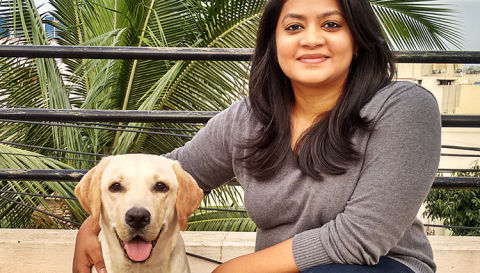All you wanted to know about dog training as a professional career option
We, at TailsLife, always endeavour to offer more to the pet parent community that is in need of valuable information relevant to the pets it raises. So, we thought why not pick the brains of some top professionals and experts dotting the Indian pet care sector.
TailsLife takes immense pride in kicking off this series with a thought-provoking conversation with Ms Nivedita Kumar, dog behaviour consultant and founder of Confident Dogs. She needs no introduction to many long-time pet owners.
For those not in the know, Nivedita is a renowned dog trainer from Bangalore. A trailblazer in the niche domain for the past few years, she continues to be an inspiration to the growing tribe of pet trainers in the country.
Over to Nivedita.
TL: Is dog training a feasible career option for everyone with a passion for pets? If so, is it prudent for them to pursue it full-time or just part-time?
NK: An ideal dog trainer should be open-minded with love for dogs as well as willing to coach people to handle their dogs. Otherwise, there are plenty of other options, such as grooming or boarding, that require minimal interactions with people.
All businesses take time to establish and make money. So, it is advisable to start this as a part-time profession and subsequently, expand into a full-time vocation. A good dog trainer with good skills and reasonable experience can survive with just this profession alone.
TL: You have been around in the now-booming Indian pet care market for the past five years. What is the kind of awareness pet parents have about the market?
NK: Over the years, thanks to the Internet, everyone is getting very much aware of dogs and various aspects involved in raising them. We also have some fantastic pet product brands, Indian and imported, available at our fingertips, literally.
Most families confess to me that they wished their former dogs had enjoyed the facilities, services and products that exist for dogs these days. The increased awareness augurs well for the well-being of dogs, thereby causing a boom in the Indian pet industry.
TL: What kind of training / certification is required for one to become a professional dog trainer in India?
NK: Unfortunately, there is no regulatory body for dog training or canine behaviour expertise. Most trainers seek out mentors that they can relate to and study or apprentice under them to learn the art of dog training. They are now equipping themselves with certifications from reputable teachers or institutions for better credibility.
TL: Could you tell us about the possible hardships in becoming a dog trainer in our country?
NK: The biggest challenge for a dog trainer is after becoming one: not being able to get support from fellow dog professionals, comprising breeders, groomers, veterinarians and dog boarding facilities. For instance, most breeders separate their pups from the mother and litter before six weeks of age. A well-bred puppy, when it comes home at seven weeks of age, should be toilet trained; not nip while playing; will be confident in most situations; should not squeal when left alone; and will not be a fussy eater. Today, these are the very issues that people dial a trainer for.
Some of my worst dog-to-dog aggression cases are due to irresponsible boarding facilities that do not follow strict routines for dogs, but let them all play unsupervised. It is comparable to choosing a good school for your kid.
TL: Where does the Indian dog training market stand currently?
NK: In terms of demand, now is a great time to try one’s hands at this profession to help dogs. And it is so wonderful to see so many new trainers taking up their roles so passionately. What the Indian scene currently needs is a body similar to APDT (US) or KCAI (UK) that brings these trainers together to share knowledge, learn and grow together. If so, there will be some level of standardisation and trainers will be able to constantly evolve their training techniques.
TL: How easy or difficult is it for a woman to pursue dog training as a career choice?
NK: Dogs respond better to a person who understands and communicates clearly to them; they do not differentiate based on gender. Women are perceived to be gentler with dogs compared to male trainers. Also, most of my clients are women at home with more time to guide and raise the dogs. So, they prefer a female trainer to come over to help them.
There is, of course, an occasional mental block from certain people about a woman handling dogs, especially big ‘unruly’ ones, but once they see the trainer’s handling skills in person, they are more convinced.
TL: What does the future – let’s say, five to ten years from now – hold for professional dog trainers?
NK: I see a great future for dog training as a profession. In the last few years, the number of trainers / canine professionals in Bangalore alone has skyrocketed and everyone is doing such a fantastic job. Also, the number of puppies and dogs being registered is only increasing. This just goes on to prove that dog trainers are only going to be much more in demand in the future.
TL: Will more and more pet parents seek trainers’ services mandatorily in the coming years?
NK: Yes, more and more people are seeing the difference professional training makes to a dog’s temperament. Our dogs now need to share urban living spaces and a good trainer should help the family to teach their dog to not only settle into their house but also to be polite to visitors and be easily handled outdoors, like at the vet’s clinic, etc.
Most veterinarians whom I know in Bangalore are now recommending mandatory training for puppies / newly adopted dogs. It is part of the initial counselling along with advice on diet and vaccinations.

